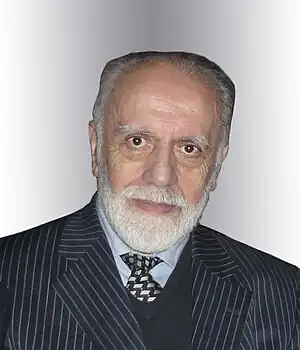Mikhail Sado
Mikhail Yukhanovich Sado (Russian: Михаил Юханович Садо, Syriac: ܡܝܟ݂ܐܝܠ ܒܝܬ ܣܗܕܐ Mixael bit Sahda), (June 9, 1934 – August 30, 2010 [1]) was an Assyrian Russian linguist, scholar, Professor of Semitic languages, orientalist, politician, former paratrooper, and wrestling champion.[2][3]
Mikhail Sado Михаил Садо | |
|---|---|
 | |
| Born | June 9, 1934 |
| Died | August 30, 2010 (aged 76) |
| Nationality | Russian |
| Alma mater | Saint Petersburg University |
| Scientific career | |
| Fields | Linguist, Scholar, Professor of Semitic languages, politician and public man |
Mikhail Sado was born on June 9, 1934, in Leningrad.[4] He was a linguist of Semitic languages and was fluent in many other Assyrian dialects. He taught Hebrew in Russian Orthodox seminaries. He obtained his doctorates in Oriental Studies at Leningrad University in 1951.[3]
Sado was one of four principal leaders who established the Russian Social Christian Union for the Liberation of Peoples.[5] He spent thirteen years (1967–1980) in prison during the Soviet Union because of his religious activism.[2][6]
Mikhail Sado's origin goes back to Hakkari, a village of Levon north of Tiari. His father was Challo and his mother Mariam. His wife Zina was born in Moscow. She was one year old when her family was forced to leave the USSR for Iran under Stalin's order. She was raised in Iran and returned to the Soviet Union in 1962.
The Sados have two sons; his youngest son Rabban Estepanos, is the presiding priest of the oldest Russian Orthodox Church in St. Petersburg, Cathedral of The Holy Trinity of St. Alexander Nevsky Monastery built in 1703–1714.[6] During Soviet rule, the government buried many communists in the gardens of this monastery to desecrate the Christian faith. This church is the seat of the metropolitan of St. Petersburg.
Rabban Estepanos speaks Assyrian fluently. He assisted his father in publishing a book in Russian on the life and accomplishments of the prominent Assyrians in the Soviet Union. Mikhail Sado's older son (a transportation business owner) funded this publication.
Sixty Assyrians in Leningrad were killed under Joseph Stalin's order. A memorial monument in their remembrance was erected in St. Petersburg on August 27, 2000. More than 1,000 Assyrians in the entire Soviet Union were killed under Stalin's order.
See also
References
- "Скончался преподаватель С.-Петербургской духовной академии М.Ю.Садо - Новости Академии - Новости - Санкт-Петербургская Православная Духовная Академия". Archived from the original on 2011-08-27. Retrieved 2015-09-10.
- James H. Billington. "Theology Today - Vol 37, No. 2 - July 1980 - ARTICLE - Christianity in the USSR". Archived from the original on 2002-03-19. Retrieved 2015-09-10.
- De Boer, S.P.; Driessen, E.J.; Verhaar, H.L.; van Amsterdam. Oost-Europa Instituut, U. (1982). Biographical Dictionary of Dissidents in the Soviet Union: 1956 - 1975. Springer Netherlands. p. 487. ISBN 9789024725380. Retrieved 2015-09-10.
- Duncan, P.J.S. (2002). Russian Messianism: Third Rome, Revolution, Communism and After. Taylor & Francis. p. 82. ISBN 9780203442357. Retrieved 2015-09-10.
- United States. Congress. Senate. Committee on the Judiciary. Subcommittee to Investigate the Administration of the Internal Security Act and Other Internal Security Laws (1973). U.S.S.R. Labor Camps: Hearings, Ninety-third Congress, First Session. U.S. Government Printing Office. Retrieved 2015-09-10.
- Zinda Magazine. "Zinda 5 December 2007". zindamagazine.com. Retrieved 2015-09-10.